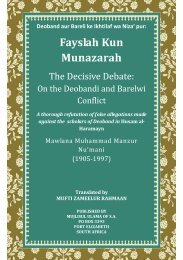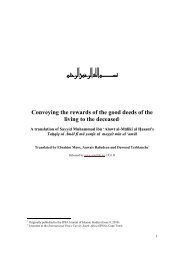al_etidaal_gn
al_etidaal_gn
al_etidaal_gn
Create successful ePaper yourself
Turn your PDF publications into a flip-book with our unique Google optimized e-Paper software.
Hazrat Abu Zar (Radi<strong>al</strong>lahu anhu) again asked: “Advise me more.”<br />
Rasulullah (S<strong>al</strong>l<strong>al</strong>lahu Alayhi Was<strong>al</strong>lam) replied: “Refrain from excessive laughter for<br />
that kills the (spiritu<strong>al</strong>) heart and causes the light of the face to depart.”<br />
Again Hazrat Abu Zar (Radi<strong>al</strong>lahu anhu) asked: “Advise me more.”<br />
Rasulull<strong>al</strong>i (S<strong>al</strong>l<strong>al</strong>lahu Alayhi Was<strong>al</strong>lam) said: “Speak the truth at <strong>al</strong>l times even though it<br />
be bitter.”<br />
When Hazrat Abu Zar (Radi<strong>al</strong>lahu anhu) again asked for more Rasulullah (S<strong>al</strong>l<strong>al</strong>lahu<br />
Alayhi Was<strong>al</strong>lam) said: “Take notice of your faults for this will prevent you from<br />
noticing the faults of others.” (Mishkat)<br />
My object in penning down these last few lines is to point out our folly. We are at <strong>al</strong>l<br />
times searching for the faults of others. If we cast a look at ourselves and do a bit of selfexamination,<br />
neither will we find the time to discuss the faults of others, nor will we have<br />
the courage to spread their faults far and wide. We will then be only too occupied with<br />
our own iniquities.<br />
In the testament (wassiyyat-nama) of Maulana Raipuri we find the following Persian<br />
Couplet:<br />
“While on board at sea, Shahab, my Sheikh, gave me two advices which were most<br />
precious to me: One: that you be not filled with your ego and Two: do not look for the<br />
faults in others.<br />
Rasulullah (S<strong>al</strong>l<strong>al</strong>lahu Alayhi Was<strong>al</strong>lam) once gave some advice to Sayyidina Ma’az<br />
(Radj<strong>al</strong>lahu anhu). Then he said to him: “And now, after <strong>al</strong>l that, sh<strong>al</strong>l I tell you that<br />
whereby it will be easy for you to act on these?”<br />
Ma’az (Radi<strong>al</strong>lahu anhu) said: “Yes, indeed, do tell me.”<br />
Rasulullah (S<strong>al</strong>l<strong>al</strong>lahu Alayhi Was<strong>al</strong>lam) then pointed towards his tongue and said: “This<br />
is it. Keep it under control.” (Mishkat)<br />
Sayyidina Ma’az (Radi<strong>al</strong>lahu anhu) asked: “0 Messenger of Allah! Will we be c<strong>al</strong>led to<br />
account for our tongues <strong>al</strong>so?”<br />
Rasulullah (S<strong>al</strong>l<strong>al</strong>lahu Alayhi Was<strong>al</strong>lam) said: “Is there anything else except the heaps of<br />
the tongue that causes a man to be cast on his face into hell?” (Mishkat, Haakim)<br />
By the “heaps of the tongue” is meant that just as the sickle cuts the crop and makes<br />
heaps in places, so the scissors of the tongue <strong>al</strong>so clips t<strong>al</strong>ks and accumulates them in one<br />
place viz, the book of one’s deeds.<br />
Al- Eti’da<strong>al</strong> Fi Maraatibur- Rija<strong>al</strong> 106




